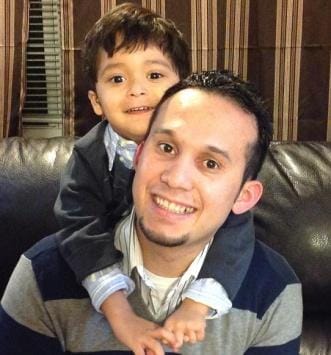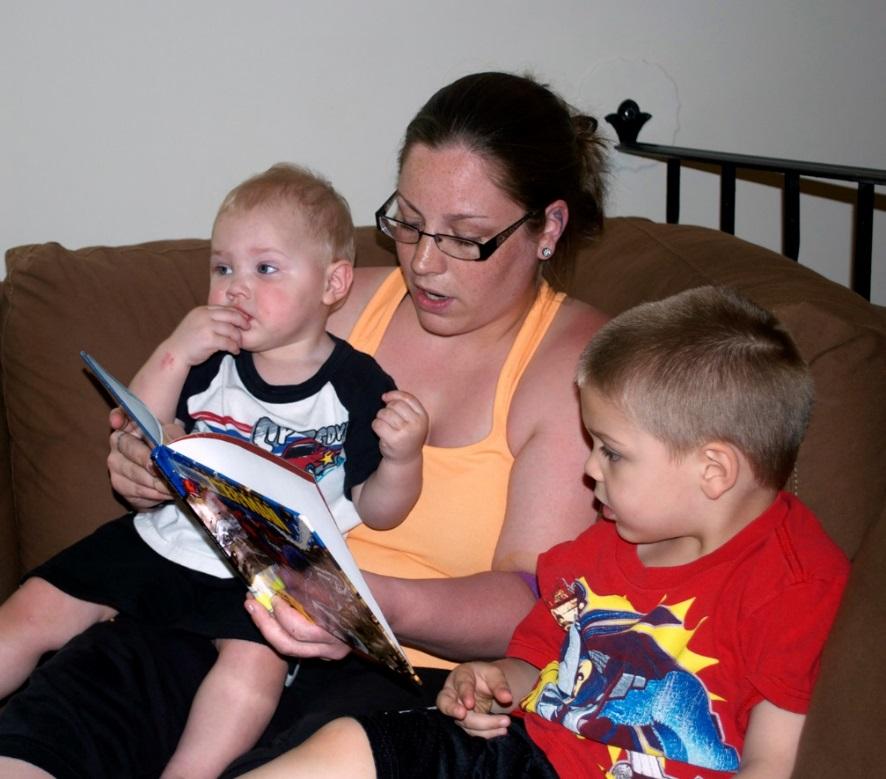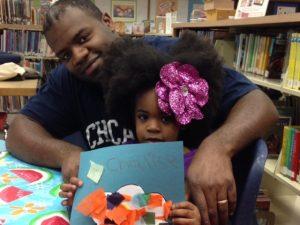Our Home-Based
Child Care Model
The Challenge
Family child care, or home-based care, is often the most accessible, culturally appropriate, and affordable child care option. It is frequently relied upon by families experiencing material poverty, yet home-based care, unlike center-based care, is largely overlooked or underserved by existing quality improvement initiatives. Opportunities for professional development are designed primarily for the center-based care model, from the language used to the time of day it is offered.
Additionally, home-based child care providers do not enjoy the same benefits as their center-based counterparts- sick leave, breaks throughout the day, or health insurance. Nationwide, 53% of child care providers were on at least one type of public assistance between 2014 and 2016. And despite these challenges, to their credit, providers still seek ways to grow and develop their craft.
High-quality care from a well-supported family care provider engaged in ongoing professional learning can yield tremendous benefit for children and families. Children learn how to be successful in kindergarten settings, and families find their most resourced and informed voice, integral to effectively championing their child and family’s needs.
This framework of support was designed with the flexibility to complement and augment the efficacy of existing quality initiatives by employing cross-system and cross-sector coordination. The model itself works in a wide variety of home-based child care environments. We work with both licensed providers in family and group-family settings and with family, friend, and neighbor providers, working in communities furthest from opportunity.
Nationally, over seven million children
use home-based child care.
Our Solution
ParentChild+ is bringing materials and supports designed specifically for home-based child care.
Our in-home approach makes it convenient for providers to access professional learning support that is individualized to capitalize on their talents and passions while strengthening their observational and reflective capacities. Instead of prescribing remedies to address perceived deficits, the Early Learning Specialist builds a relationship with the provider with the aim of learning how best to support them. Over the course of the 24-week program, the child care provider receives 48 home visits and acquire a library of:
- 12 high quality books and educational materials selected for their applicability to multiple age groups (2 months to 5 years)
- Accompanying guide sheets that support the facilitation of learning through play.
The emphasis on strengthening providers’ capacity for self-reflection becomes a habit, part of their “operating system” as a professional. Once this is established, providers engage in continuous quality improvement independently.
We Invest in Building Individual and Collective Capacities
The Home-Based Child Care model was designed to magnify providers’ connection to the children and families in their care, their colleagues, their communities, and broaden their network of professional opportunity.
At the nucleus of ParentChild+’s Home-Based Child Care model is an emphasis on the quality and strength of interactions and relationships. Because this extends beyond the children enrolled, family engagement is also an integral component of the model. Providers are perfectly positioned to recommend community-based services to children and families and benefit from support identifying or demystifying accessing them. As members of the same community, Early Learning Specialists have existing relationships with school districts and social service organizations that can provide a range of supports and can share personal experiences they have had referring neighbors and friends to these resources.
A new component of the model, Communities of Practice (CoP) cultivate an ethos of continuous quality improvement and growth-mindset. As such, they are an effective mechanism for sustainable quality improvement. Through their engagement in a CoP, providers share practical and actionable advice, and build resilience through support from peers who share the same challenges and opportunities every day. After engaging as a participant, providers are encouraged to take a more active role in organizing and facilitating their Community of Practice. Meeting with their colleagues affords providers a reliable space to discuss issues from a systems-level such as policy, workforce compensation, and child care deserts. Through this discourse they become active in the advancement of their profession, build advocacy skills and become agents of change in the field. This confidence and knowledge enable providers to navigate emerging challenges long after their work with ParentChild+.
We Hire Local
Each provider is matched with a community-based Early Learning Specialist who shares their culture and language and visits with them twice a week. Our Early Learning Specialists know the neighborhoods they are working in, the challenges that may come with living there, and the resources the families can access.
ParentChild+ prioritizes linguistic and cultural fit over formal education. To ensure Early Learning Specialists possess the essential knowledge, skills, and abilities for implementation to model-fidelity, they undergo rigorous onboarding that includes cycles of observation and guided reflection with their supervisors, the same approach they will soon employ with providers. To maintain calibration, Early Learning Specialists and their supervisors engage in continuing professional learning.
Our Results
Since 2009, the ParentChild+ Home-Based Child Care model has been implemented in communities in New York, New Jersey, Minnesota, Massachusetts, Washington, South Carolina, Pennsylvania, and Ohio.
Our Home-Based Child Care work has successfully improved provider-child interaction, enriched care environments, and connected the families of the children in care with information and materials to support the development of school readiness and early literacy skills at home.
ORS Impact, a 3rd-party evaluator, completed a formal evaluation (conducted via standardized assessment tools; provider, Early Learning Specialists, and parent interviews and surveys; and focus groups) of the Home-Based Child Care model. The evaluation utilized a modified version of the Home-Based Child Care Environment Rating Scale (FCCERS-R) and the Caregiver Interaction Scale (CIS). Assessments were conducted pre-and post-program to determine the frequency and quality of interaction in the care setting and the quality and developmentally appropriate implementation of school readiness activities. The outcomes of this evaluation are consistent with Program data that ParentChild+ has been collecting since it began implementing the Home-Based Child Care model. The evaluation also examined the model’s impact on parent and child outcomes as follows:
Providers:
- Demonstrated significant improvements across all assessments, showing increased quality and learning-richness of care environments (FCCERS-R) and improved provider-child interactions (CIS).
- FCCERS scores pre and post program show increase in all subscales including: Interactions, Listening and Talking, Activities and Provision for Parents.
- In self-reports, providers showed significant behavioral change post-program, and reported being positively impacted by the Program.
Children:
- Early Learning Specialists reported positive changes in children throughout the course of the Program, including increased use of language, greater engagement and enthusiasm, and increased social-emotional maturity.
- Parents reported noticeable changes in their children’s skills across early literacy, executive function, and social-emotional domains.
Parents:
- Reported frequent use of the guide sheets and books that were sent home.
- Reported substantially decreased screen time by post-program.
- Reported increased interactions with their children over the course of the Program, with greatest improvement in reading, verbal interactions, conversation, stories, imaginary play, music and movement from at least once a week to most days.
- Early Learning Specialists and providers reported noticeable changes in parent engagement and creative approaches building the books and guide sheets sent home.
Home-Based Child Care In Action
Start a ParentChild+ in Your Community
Find out how you can bring ParentChild+ FCC to your community and all the possibilities it brings to support school readiness in your community.
Success Stories
Do our models really work? The proof is in the stories told by our students, parents, and teachers. Read some of our favorite success stories below to see tangible evidence of our proven programs.






